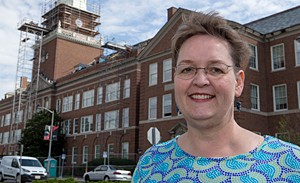
Hell Hath No Fury Like A Female Superhero Scorned (By Fans)
The devoted followers of comic book heroes are diversifying beyond the likes of Sheldon, Leonard, Raj and Howard as depicted on the CBS Networks The Big Bang Theory.
, a pop culture researcher and associate professor of English at the University of Cincinnati, says thats partly what caused the Internet to Hulk out after fans flocked to Avengers: Age of Ultron.
Borah is among the UC faculty presenting at the regional conference of the
Midwest Popular Culture Association/Midwest American Culture Association
which takes place Oct. 1-4, at the Hilton Cincinnati Netherland Plaza Hotel downtown.
Borahs paper, Put Down Your Pitchforks: Fertility, Freak-outs and Monstrosity in 'Age of Ultrons' Black Widow Controversy examines how social media erupted in outrage and even death threats following one of the films subplots that romantically linked the Black Widow (played by actress Scarlett Johansson) with Bruce Banner/The Hulk (played by Mark Ruffalo), as well as the fallout from the press junket when cast members Jeremy Renner and Chris Evans joked about the sexuality of the teams sole female character.
Fan anger and hate speech also boiled over from a scene in the movie for Black Widows alter ego, Natasha Romanoff. In that scene, she confessed to Bruce Banner (the Incredible Hulks alter ego) that she was sterilized and later said, Still think youre the only monster on the team?
Some interpreted this to mean Natasha thought her infertility made her a monster, Borah says. She adds that the passion over the controversy is partly due to a growing female fan culture as well as a younger fan base in a genre that at one time attracted primarily males a genre in which females are still underrepresented and still provocatively costumed to reflect the Marvel Universe comic book art stretching back to the 1940s.
Comic books are traditionally very exploitative of females, but there has been progress, Borah says. Still, there are people who feel that in order for Black Widow to be a strong female character, she cant have a love interest.
Also, shes not shown in the movies as actually promiscuous. Shes seductive, but shes a spy thats her job, continues Borah, amid the fallout from the promotional press junket.
Borah adds that the Black Widow also got a back seat when it comes to merchandise that was marketed for the movie. People cant buy clothing, toys and action figures of her for their kids like they can for most of the male characters. Theyd like to see her on a T-shirt with the team, and this isnt just reactions from women. The social media feedback indicates men would like this, too, says Borah.
Borahs presentation explores participatory culture theory in examining how future Internet freak outs can be avoided. Is there a way to have a discussion thats more constructive instead of tearing each other down, when a lot of times fan factions and creators interests are not that far apart? Adding more strong, diverse female characters is one remedy, so one female character doesnt have to represent an entire sex. People love the Black Widow character so much and so dearly that theyre almost too invested in the character, and the anonymity of the Internet turned things as mean and as horrible as ever.
In fact, Borah says that the social media monsters and extremists are far worse than the monsters on the big screen. The anonymousness of the Internet makes bullying too easy. Whether its something as legitimate of a problem as Gamergate or über-radical feminists calling out other feminists, social media is a double-edged weapon that can also deliver blunt-force trauma, Borah says. When its used for good causes, it can have a positive impact, even beyond the immediate fandom. When its a wildfire of backlash without reflection or dialogue, it silences creativity and cooperation between parties that ought to be allies in bigger social issues.
Borahs presentation at the Midwest Popular Culture Association/Midwest American Culture Association is part of a panel examining horror and science fiction/fantasy.
The mission of the Popular Culture Association/American Culture Association is to promote the study of popular culture throughout the world through the establishment and promotion of conferences, publications and discussion. The PCA/ACA actively tries to identify and recruit new areas of scholarly exploration and new and innovative ideas.
UCs
Department of English and Comparative Literature
in the
McMicken College of Arts and Sciences
fosters the liberal arts by focusing on English-language texts across four mutually interrelated disciplines: literary and cultural studies, creative writing, professional writing, and rhetoric and composition.
Related Stories
Distinguished UC professor receives career achievement...
July 3, 2025
The College of Arts and Sciences Research Professor Gail Fairhurst was awarded an International Communications Association (ICA) Career Achievement Award. The Steve Chaffee Career Achievement Award goes to theoretical development or research related to communication studies. The ICA created the award in 2000 for its namesake, Steven H. Chaffee, who was a trailblazing scholar in journalism and communications academia.
Pint-size pioneer ‘Dora the Explorer’ celebrates her 25th
July 2, 2025
Erynn Casanova, head of the Department of Sociology at the University of Cincinnati who conducted early research on Latino representation in children’s television, was cited in an Associated Press (AP) article on the role "Dora the Explorer" played in popular culture.
Getty reopens with exhibition with UC Classics
June 30, 2025
Los Angeles media highlight UC Classics discoveries in exhibition opening at the J. Paul Getty Museum, which closed in January after deadly wildfires.
